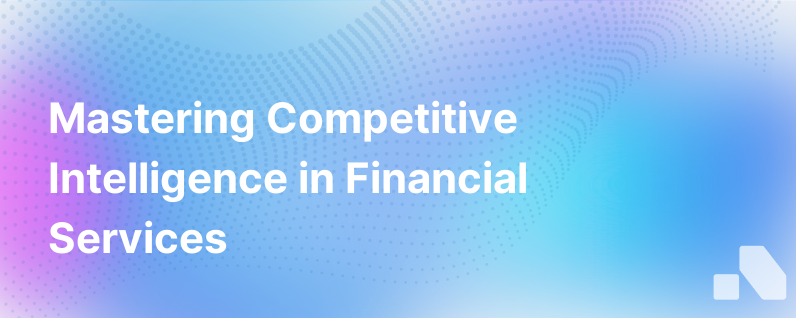
The financial services industry is one of the most competitive and rapidly changing landscapes in the business world. The key to navigating this landscape and emerging victorious lies in having an edge over your competitors - and the secret weapon to gaining that edge is Competitive Intelligence (CI).
This intelligence enables financial service institutions to stay ahead of the curve and make robust strategic decisions, while identifying potential threats and opportunities in the marketplace. In this guide, we'll explore what Competitive Intelligence entails, its importance, and how you can harness it within the financial services industry.
Understanding Competitive Intelligence
Competitive Intelligence is the art of gathering, analyzing and acting on information about your industry's competitive environment. It involves collecting data from various sources, diligently analyzing it, and then applying the insights gleaned in strategic decision-making.
In the financial services sector, CI can encompass data on aspects like market trends, customer preferences, regulatory changes, or competitor products, pricing, distribution, and marketing tactics. The aim is to get an in-depth understanding of the competition, allowing for proactive strategy formulation and execution.
The Importance of Competitive Intelligence in Financial Services
Competitive Intelligence is not a mere luxury in the financial services industry; it's a necessity. Here's why:
- Informed Decision Making: CI helps in making informed and strategic decisions. Whether it's entering a new market, launching a new product, or modifying pricing structures, CI provides the essential data to guide these decisions.
- Identifying Trends: By examining competitors and the wider market, it's possible to spot emerging trends early. Firms can then capitalize on these trends ahead of their rivals.
- Risk Mitigation: Understanding your competition helps in assessing risks and threats. With a solid CI process, unforeseen challenges can be identified and navigated more effectively.
- Improving Offerings: By studying competitor products and services, companies can identify gaps in their own offerings and make necessary enhancements to stand out.
- Anticipating Competitor Moves: A strong understanding of competitor strategies can enable firms to anticipate their moves and stay one step ahead.
How to Leverage Competitive Intelligence
Here's a step-by-step guide to leveraging Competitive Intelligence in financial services:
-
Establish Objectives: First, define what you want to achieve with the insights gained from CI. Your objectives could range from identifying rival strategies to understanding changing customer preferences.
-
Designate a CI Team: It's best to assign a dedicated team or an individual to carry out the CI activities. This team will be responsible for data collection, analysis, and rendition of the findings into actionable insights.
-
Identify Data Sources: CI data can come from various sources, both public and private. Annual reports, public filings, media reports, social media, proprietary databases, and trade shows can all be used for intelligence gathering. Services like Aomni can help automate and speed up this process, providing real-time insights with zero effort.
-
Collect and Analyze Data: The data collection should be systematic and thorough. Post data collection, a careful analysis should be carried out to translate the data into meaningful insights about competitors and market trends.
-
Share and Apply Insights: Once all information has been sourced and analyzed, share it with all relevant members of your team. It's vital that these insights are then utilized to inform strategic decision-making.
Challenges and Solutions
Competitive Intelligence gathering does come with some challenges. Financial services companies often struggle with issues such as huge volumes of data, frequent market changes, and difficulty in translating data into actionable insights.
Adopting an AI-based platform like Aomni can help overcome these challenges. Aomni delivers the essential tools to collect real-time account research, derive actionable insights, and present personalized sales content swiftly and efficiently. It uses advanced AI to automate the CI process, thus reducing effort and human error, while enhancing timeliness, coverage, and accuracy of the data.
Conclusion
Competitive Intelligence is a strategic weapon in the financial services sector. It leads to informed decisions, helps spot trends early, enables risk mitigation, and improves product offerings. Even though the CI process may present challenges, utilizing an AI-based platform like Aomni can help ease the process. With diligent use of Competitive Intelligence, financial services firms can steadily scale their way to the top of the industry's competitive landscape.